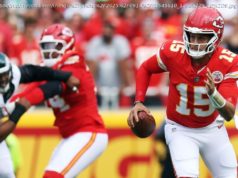US stocks finish barely higher, but grocery stores, wholesale clubs and other retailers drop after Amazon said it will buy Whole Foods.
Amazon’s $13.7 billion deal for Whole Foods sent grocery stores, big retailers, and food makers and distributors plunging Friday. Energy companies rose while other stocks were little changed.
It’s rare for a single deal to have a big effect on the broader stock market, but Amazon’s agreement to buy Whole Foods Market did. Investors wondered if Amazon will do to grocery stores and supermarkets what it’s done to sellers of goods like clothing and office supplies: force them to make big changes or be supplanted.
Neil Saunders, managing director of the research firm Global Data Retail, said Amazon is likely to push supermarkets and grocery stores to slash prices, which will affect the companies that make and distribute those products.
«As Amazon enters the grocery market proper, it will put a lot more pressure on existing grocers, » he said. «Those grocers will respond by cutting prices and that will cut profits for the distributors.»
Elsewhere, energy companies rose as oil futures bounced back from their lowest price this year and utilities and industrial and basic materials ground out modest gains.
Thanks to a late gain, the Standard & Poor’s 500 index inched up 0.69 points to 2,433.15. The Dow Jones industrial average added 24.38 points, or 0.1 percent, to a record high of 21,384.28. The Nasdaq composite fell 13.74 points, or 0.2 percent, to 6,151.76. The Russell 2000 index of smaller company stocks shed 3.36 points, or 0.2 percent, to 1,406.73.
Online juggernaut Amazon said it pay $42 a share for Whole Foods. Whole Foods had been the target of sale rumors for about two months, and investors appeared to wonder Friday if another bidder may step in. Its stock jumped $9.62, or 29.1 percent, to a two-year high of $42.68. Amazon climbed $23.54, or 2.4 percent, to $987.71.
Many investors had expected Amazon to get into the grocery business. It already runs AmazonFresh, a grocery delivery service that costs $14.99 a month for members of its Prime service, and it recently opened a few grocery stores. Investors dumped retailers, drugstores, and even discount chains. Many of them have started trying to sell more groceries in the last few years to try to capitalize on shoppers’ yen for fresher, more natural food. That was a trend Whole Foods helped start.
Wal-Mart had its worst day in more than a year as it fell $3.67, or 4.7 percent, to $75.24. Costco took its biggest loss in almost six years as it sank $12.95, or 7.2 percent, to $167.11. Target tumbled $2.85, or 5.1 percent, to $52.61.
Amazon is a unique threat to many retailers because it doesn’t mind losing money for long stretches. The company might be able to sell inexpensive groceries as it makes its money from its cloud computing business and its gigantic online marketplace.
«Is the future of grocery store shopping going to be a point and click experience, or is it going to be going to a grocery store?» said Dan Morgan, senior portfolio manager at Synovus Trust.
Supermarkets and grocery stores had also plunged Thursday after Kroger cut its annual forecast. Kroger, which plunged 19 percent a day ago, lost another $2.27, or 9.2 percent, and hit a three-year low of $22.29. Sprouts Farmers Market skidded $1.41, or 6.3 percent, to $21.01.
Campbell Soup fell $1.91, or 3.4 percent, to $55.05 and General Mills dipped $1.73, or 2.9 percent, to $57.10. United Natural Foods dropped $4.36, or 11 percent, to $35.39.
Benchmark U. S. crude rose 28 cents to $44.74 a barrel in New York. Brent crude, used to price international oils, climbed 45 cents, or 1 percent, to $47.37 a barrel in London. Occidental Petroleum jumped $2.43, or 4.1 percent, to $61.83 and Chevron gained $2.02, or 1.9 percent, to $108.35.
Wholesale gasoline rose 2 cents to $1.45 a gallon. Heating oil added 1 cent to $1.43 a gallon. Natural gas dipped to 2 cents to $3.04 per 1,000 cubic feet.
Defense contractor Booz Allen Hamilton tumbled after it said the Department of Justice is investigating its accounting practices and the way it charges the U. S. government. The company said it is cooperating with the investigation and its own auditing hasn’t turned up any major erroneous costs or problems. The stock fell $7.43, or 18.9 percent, to $31.90.
Bond prices rose. The yield on the 10-year Treasury note fell to 2.16 percent from 2.17 percent. The yield on the 2-year Treasury note fell to 1.31 percent from 1.35 percent.
Gold rose $1.90 to $1,256.50 an ounce. Silver slipped 6 cents to $16.66 an ounce. Copper stayed at $2.56 a pound.
The dollar edged up to 110.84 yen from 110.79 yen. The euro rose to $1.1195 from $1.1155.
European stock indexes rose after Greece reached a deal with its eurozone creditors. The agreement means the country won’t face the risk of bankruptcy when it has to make a big debt payment next month. France’s CAC 40 added 0.9 percent and the DAX in Germany climbed 0.5 percent. Britain’s FTSE 100 gained 0.6 percent.
Japan’s Nikkei 225 stock index rose 0.6 percent after the Bank of Japan said there are signs of improvement in the world’s third-largest economy. South Korea’s Kospi finished little changed. Hong Kong’s Hang Seng rebounded 0.2 percent.
Sign up today for a 30 day free trial of unlimited digital access.






